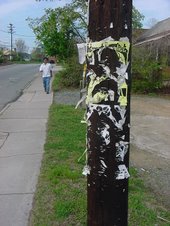 The Chapel Hill News
The Chapel Hill NewsMay 8, 2002
Page A1
By Virginia Knapp
CHAPEL HILL -- It's a message some folks want plastered all over town: Let us stick flyers on telephone poles.
More than 800 people have signed a petition asking the Town Council to repeal an ordinance banning posters on utility poles. They say that the problem is that there aren't nearly enough spaces where bands, small businesses and anyone willing to spend a few cents at Kinko's can exercise their freedom of speech.
"The free speech issue is the most important thing here," said Erik Ose, the Lost City music store owner who is leading the petition drive. "We want to show council that a lot of people care about this issue and that this is an ordinance that serves no useful purpose."
It took a ticket for Ose to start the petition drive.
In April, Ose was hanging flyers on utility poles along Franklin Street for the Banquet for Global Peace and Justice, a dinner sponsored by Internationalist Books, the Triangle Free Press and the UNC Campaign to End the Cycle of Violence.
In front of the Franklin Street post office, Ose was stopped by Chapel Hill Police officers, who asked him to tear down the flyers he had just tacked up. When he refused, Ose was cited for violating section 16.3 of the town ordinances.
"Both officers said they were surprised by my willingness to waste my time and money by being written up and having to go to court over this issue, when I could have done what everyone else they've ever caught in the act of postering on telephone poles does," Ose said. "Namely, torn my own posters down, apologize and go on to the next corner to put up more posters once the officers' backs were turned.
"But why should a citizen have to play cat and mouse with the police?"
The ordinance banning signs on utility poles is a long-standing one. Ose found the regulation in codes dating back to 1925.
"It was probably passed to prohibit excessive commercial appeals by businesses," Ose said. "But there's an important difference between the Chapel Hill of 1925 and today. Today you're more than likely to be advertising a concert or a social issue or you're advertising a small local business without a huge advertising budget."
One argument that the pole-poster advocates use is that the fliers help nonprofits and small businesses spread their messages.
"No nonprofits I know of have an ad budget the size of Wal-Mart's," said Andrew Pearson, a UNC student who was helping Ose post flyers for the peace banquet. "It's a shame they can't put up a flyer on a utility pole to advertise."
Another argument is that the town has taken down all but two of the five kiosks on Franklin Street where it was legal to post flyers.
"It's a problem of the town's own making because people don't have enough places to post," said Matt Barrett, co-owner of the Poster Guys, a business that posts flyers for everything from university functions to church services. "I don't think a telephone pole is a thing of beauty, anyway, so anything that can make it more useful is good."
Curtis Brooks, the town's landscape architect, says the old kiosks were in poor repair and needed to be taken down as part of Streetscape improvements downtown.
A new kiosk went up recently in front of the town-owned parking lot at the corner of Rosemary and Columbia streets. Unlike the old wooden pole and shingle kiosks, the new one is made of fabricated metal and plywood for the posting boards.
"This is new design, so we decided to install one as a prototype," Brooks said, adding that he hopes the others will be installed by the end of the year. "I'm very pleased with it."
The kiosks are cleared of posters weekly by the Public Works Department, and Ose suggests that the poles could be cleared with the same regularity. Public Works employees clear the utility poles of illegal posters every other day or so now.
"Revising and repealing the ordinance would provide a cost-effective way to make sure people's messages are being heard," Ose said, comparing the easy availability of poles to the cost of installing more kiosks. "It also would save the town money by not having Public Works go out to tear down the posters."
But some folks like having the posters torn down. People who support the ordinance say the flyers, torn scraps of paper and staples hurt the town's appearance.
"I think it looks pretty trashy if you have people sticking posters up all over town," said Mickey Ewell, owner of Spanky's and 411 West restaurants on Franklin Street.
However, Barrett defended the posters as an enhancement.
"People who run the town are very hung up on appearances. They want it to look like a mall," Barrett said. "I'm all for posting on telephone poles. It makes it look like the town has something going on."
Ose agreed.
"What looks better: A pole covered with staples and torn, jagged scraps of paper or a pole that is covered with brightly colored posters?"
The council will take up the petition again in June, but Ose will present additional petition signatures at the council's next business meeting on Monday.
That's a week before Ose's May 20 court date to fight his citation for postering.

